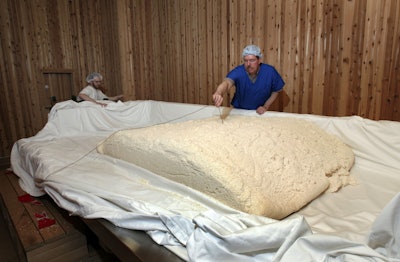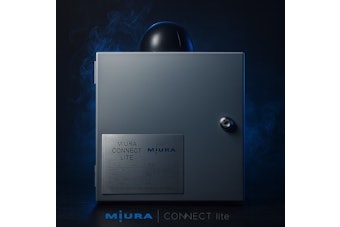As food processors continue to look for ways to improve their operations and products, an alternative protein processor looks outside the box for enhancements. Nosh.bio, a Berlin-based food technology company who focuses on producing cost-effective, nutritious, and sustainable products, is adopting koji, a fungus used to make traditional Japanese food, to enhance protein processing and product quality, as reported by Forbes.
Nosh.bio follows a process similar to beer-making to produce koji protein, according to Tim Fronzek, the company’s co-founder.
“We fill huge steel tanks with water, a carbon source for koji to feed on, some micronutrients and then add koji. By simply blowing air into the liquid, the koji starts to grow and in less than 24 hours, the tanks are filled with fermented koji. We filter the mash, and it is done,” Fronzek tells Forbes.
The protein process results in several sustainability benefits, highlighted by leaving only a fraction of carbon footprints, compared to beef production, Fronzek says. However, the CEO also states that the fermentation process still requires energy, so the company is using solar energy as a renewable resource. Moreover, Fronzek says the company is striving to “switch the carbon source from conventional sugars to something that is a byproduct of other areas in the food industry,” such as using water from potato processing facilities.
Enhanced product quality and flexible applications
Koji’s makeup is similar to the animal protein collagen, which makes it useful for achieving more palatable textures and flavors.
“Unlike other alt-protein processes that heavily manipulate texture, we preserve the native fiber alignment of Koji mycelium to deliver authentic, meat-like textures,” states Fronzek.
Fronzek says that unlike some other plant-based proteins that tend to taste bitter or sour and need to be masked before being processed, koji does not require such treatment and yields a natural umami flavor. For sweet items, Fronzek says Nosh.bio can remove the umami flavor, further highlighting the fungus’ versatility.
Furthermore, Nosh.bio finds koji protein to be adequately nourishing, given its “protein ratio is comparable to real meat. The percentage varies, depending on the moisture content of the form of the product, but the driest powder form can have up to 50% of protein with a complete amino acid profile. Also, koji protein is high in natural fiber and low in fat,” Fronzek adds.
Nosh.bio’s produces koji protein comes in fresh, dry, and powder formats that can be used for diverse applications. Most notably, it can be used a meat alternative for products like burgers or gyros and can be blended with ground meat.
Manufacturers who use beef products may take interest in using koji protein especially due to shorter cattle supply.
In its mid-year “Cattle” report, the USDA reported a “further tightening” of calves expected for placement into feedlots in late 2025 and 2026. To keep up with steady demand, manufacturers may look to use koji as an alternative while they await cattle supply to return to stable levels.
It seems koji’s ability to help processors reduce carbon footprints and enhance product quality while remaining a versatile additive may make it worthwhile to companies in and out of the alternative protein space.





















